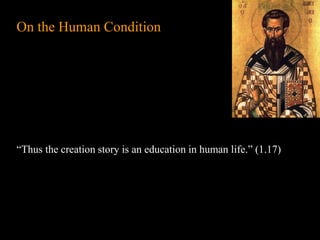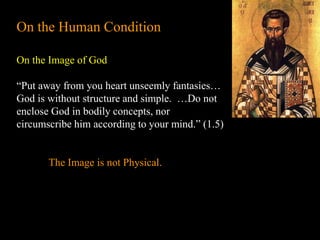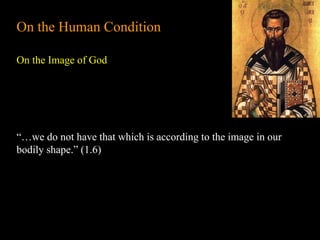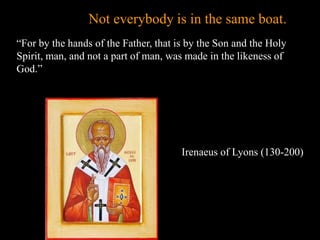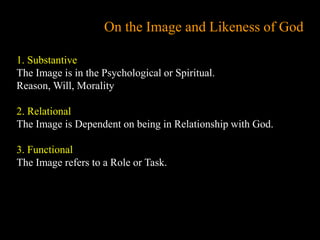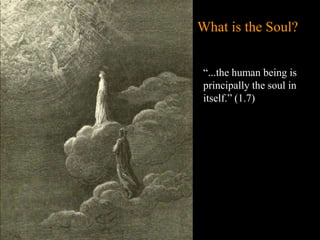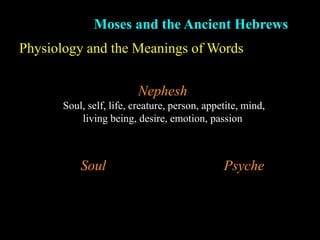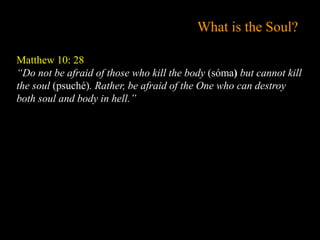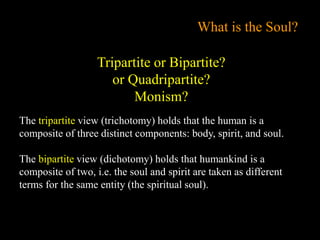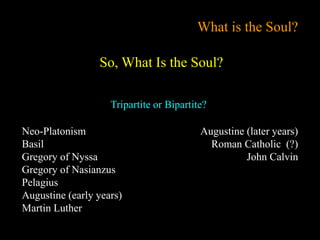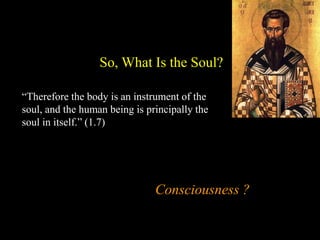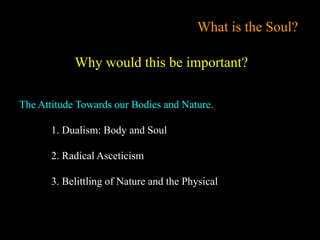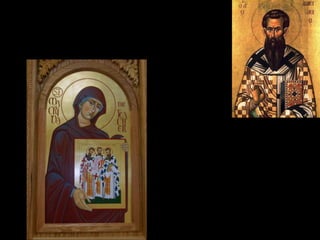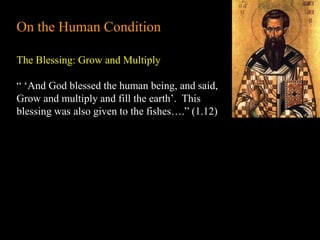basil of caesarea part two
- 1. Basil of Caesarea Part Two I, Human
- 2. Two Sermon Series The Six Days of Creation (The Hexaemeron) On the Human Condition
- 3. On the Human Condition “...the most difficult of sciences is to know one’s self.” (Hex. p. 106) “For just as our eyes see external things but do not see themselves …our mind does not see itself otherwise than by examining the Scriptures.” (1.1)
- 4. On the Human Condition “...the most difficult of sciences is to know one’s self.” (Hex. p. 106) “For just as our eyes see external things but do not see themselves …our mind does not see itself otherwise than by examining the Scriptures.” (1.1) The Limitations of Ancient Science
- 5. On the Human Condition “Thus the creation story is an education in human life.” (1.17)
- 6. On the Human Condition “Do not despise the wonder that is in you. For you are small in your own reckoning, but the Word will disclose that you are great.” (1.2) “I praise you because I am fearfully and wonderfully made; your works are wonderful, I know that full well.” (Psalm 139)
- 7. On the Human Condition “From this small work of construction (human body), I understand the great Fashioner.” (1.2)
- 8. On the Human Condition On the Image of God “Put away from you heart unseemly fantasies… God is without structure and simple. …Do not enclose God in bodily concepts, nor circumscribe him according to your mind.” (1.5) The Image is not Physical.
- 9. On the Human Condition On the Image of God “…we do not have that which is according to the image in our bodily shape.” (1.6)
- 10. “God in not born or made. He is of an ever-abiding nature without beginning and without end. He is immortal, perfect, and incomprehensible. Now, when I say that He is ‘perfect,’ I mean that there is no defect in Him and that He is not in need of anything. Rather, all things are in need of Him... He has no name, for everything that has a name is related to created things. He has no form, nor any bodily members... He is neither male nor female. The heavens do not limit him.” Aristides of Athens (2nd cent)
- 11. “Whatever is a property of physical bodies cannot be attributed to either the Father of the Son.” Origen of Alexandria (184-253)
- 12. “He cannot be seen – He is too bright for vision. He cannot be comprehended, for He is too pure for our discernment. He cannot be estimated, for He is too great for our perception. And, therefore, we are only worthy estimating Him when we say that He is inconceivable... He is one, and His entirety is everywhere diffused.” Cyprian of Carthage (d. 258)
- 13. On the Human Condition On the Image of God “It speaks of the inner human being.” (1.7) “ ‘according to our (God’s) image’ …the superiority of reason.” (1.7)
- 14. “For by the hands of the Father, that is by the Son and the Holy Spirit, man, and not a part of man, was made in the likeness of God.” Irenaeus of Lyons (130-200) Not everybody is in the same boat.
- 15. On the Human Condition The Likeness “By creation we have the first (image), and by our free choice we build the second (likeness). In our initial structure co-originates and exists our coming into being according to the image of God. By free choice we are conformed to that which is according to the likeness of God. And this is what is according to free choice: the power exists in us but we bring it about by our activity.” (1.16)
- 16. On the Human Condition The Likeness “For I have that which is according to the image in being a rational being, but I become according to the likeness in becoming a Christian.” (1.16) “If you become a hater of evil, free of rancor…. If you become brother-loving and compassionate…. If you forgive your enemy from you heart… you are like God…. Put on Christ, and drawing near to him is drawing near to God” (1.17)
- 17. On the Human Condition The Likeness “But now the one (image) is given, the other (likeness) is left incomplete; that you may complete yourself, become worthy of the recompense by God.” (1.17) “What is Christianity? Likeness to God as far as is possible for human nature.” (1.17)
- 18. Basil on the Image and Likeness 1. Image is viewed as Substantive (Reason). 2. Image and Likeness are two different things. 3. We have the Issue of “Free Will”.
- 19. On the Image and Likeness of God 1. Substantive The Image is in the Psychological or Spiritual. Reason, Will, Morality 2. Relational The Image is Dependent on being in Relationship with God. 3. Functional The Image refers to a Role or Task.
- 20. On the Human Condition What am I? “Therefore the body is an instrument of the soul, and the human being is principally the soul in itself.” (1.7) “The human being is a rational creature of God, having come into being according to the image of his Creator.” (1.11)
- 21. What is the Soul?
- 22. What is the Soul? “...the human being is principally the soul in itself.” (1.7)
- 23. Moses and the Ancient Hebrews Physiology and the Meanings of Words Nephesh Soul, self, life, creature, person, appetite, mind, living being, desire, emotion, passion PsycheSoul
- 24. What is the Soul? Matthew 10: 28 “Do not be afraid of those who kill the body (sóma) but cannot kill the soul (psuché). Rather, be afraid of the One who can destroy both soul and body in hell.”
- 25. What is the Soul? Matthew 10: 28 1 Thessalonians 5: 23 “May God himself, the God of peace, sanctify you through and through. May your whole spirit (pneuma), soul (psuché) and body (sóma) be kept blameless at the coming of our Lord Jesus Christ.”
- 26. What is the Soul? Matthew 10: 28 1 Thessalonians 5: 23 Hebrews 4: 12, 13 “For the word (logos) of God is alive and active. Sharper than any double-edged sword, it penetrates even to dividing soul (psuché) and spirit (pneuma), joints and marrow; it judges the thoughts and attitudes of the heart (kardia). Nothing in all creation is hidden from God’s sight. Everything is uncovered and laid bare before the eyes of him to whom we must give account.”
- 27. What is the Soul? Matthew 10: 28 1 Thessalonians 5: 23 Hebrews 4: 12, 13 Luke 10: 26, 27 “’What is written in the Law?’he replied. ‘How do you read it?’ He answered, ‘Love the Lord your God with all your heart (kardia) and with all your soul (psuché) and with all your strength (ischus) and with all your mind (dianoia)’; and, ‘Love your neighbor as yourself.’”
- 28. What is the Soul? Tripartite or Bipartite? or Quadripartite? Monism? The tripartite view (trichotomy) holds that the human is a composite of three distinct components: body, spirit, and soul. The bipartite view (dichotomy) holds that humankind is a composite of two, i.e. the soul and spirit are taken as different terms for the same entity (the spiritual soul).
- 29. So, What Is the Soul? Is the Soul Mortal or Immortal? Clement of Rome Ignatius of Antioch Justin Martyr Plato Tertullian Augustine Historically Majority View
- 30. “Now that the soul lives, no one would deny. But if it lives, it lives not as being life, but as the partaker of life; but that which partakes of anything, is different from that of which it does partake. Now the soul partakes of life, since God wills it to live. Thus, then, it will not even partake (of life) when God does not will it to live. For to live is not its attribute, as it is God’s... ...the soul leaves the body, and the man exists no longer; even so, whenever the soul must cease to exist, the spirit of life is removed from it, and there is no more soul.” Justin Martyr
- 31. So, What Is the Soul? Pre-existent or Not? Origen and a few followers Christian Majority
- 32. What is the Soul? So, What Is the Soul? Corporeal or Incorporeal? Stoics Tertullian Christian Majority
- 33. What is the Soul? So, What Is the Soul? Direct Creation or Traducianism? Pelagius Jerome Tertullian Gregory of Nyssa Undeclared Augustine
- 34. What is the Soul? So, What Is the Soul? Tripartite or Bipartite? Neo-Platonism Basil Gregory of Nyssa Gregory of Nasianzus Pelagius Augustine (early years) Martin Luther Augustine (later years) Roman Catholic (?) John Calvin
- 35. What is the Soul? Apollinarianism The Pelagian Controversy The Tripartite position became less favored due to ...
- 36. So, What Is the Soul? “Therefore the body is an instrument of the soul, and the human being is principally the soul in itself.” (1.7) Consciousness ?
- 37. So, What Is the Soul? “In Sacred Scripture the term ‘soul’ often refers to human life or the entire human person. But ‘soul’ also refers to the innermost aspect of man, that which is of greatest value in him, that by which he is most especially in God's image: ‘soul’ signifies the spiritual principle in man.” (Catechism of the Catholic Church, #363)
- 38. What is the Soul? Why would this be important? The Attitude Towards our Bodies and Nature. 1. Dualism: Body and Soul 2. Radical Asceticism 3. Belittling of Nature and the Physical
- 39. On the Human Condition Male and Female “The natures are alike of equal honor, the virtues are equal, the struggles equal, the judgment alike. Let her not say, ‘I am weak.’ The weakness is in the flesh, in the soul is the power…. Soul indeed is equal in honor to soul; in the coverings (body) is the difference.” (1.18)
- 41. On the Human Condition To Rule the Earth (Gen 1: 26) “Rule the thoughts in yourself, that you may become the ruler of all beings.” (1.19) “Then God said, “Let us make mankind in our image, in our likeness, so that they may rule over the fish in the sea and the birds in the sky, over the livestock and all the wild animals and over all the creatures that move along the ground.”
- 42. On the Human Condition To Rule the Earth (Gen 1: 26) “But in what is the ruling principle? In the superiority of reason.” (1.6) “ ‘And let them rule.’ Not, ‘let us make the human being, and let them be angry and lustful and sorrowful,’ for the passions are not included in the image of God, but the reason is master of the passions.” (1.7)
- 43. On the Human Condition To Rule the Earth (Gen 1: 26) “And why do you serve the passions as a slave? For what reason do you make yourself a prisoner of the devil? You were appointed ruler of creation, and you have renounced the nobility of your own nature.” (1.7)
- 44. On the Human Condition To Rule the Earth (Gen 1: 26) “And why do you serve the passions as a slave? For what reason do you make yourself a prisoner of the devil? You were appointed ruler of creation, and you have renounced the nobility of your own nature.” (1.7) “...receiving the power to rule through the superiority of reason…” (1.9) “…though skill* all things become accessible to him.” (1.10)
- 45. On the Human Condition The Blessing: Grow and Multiply “ ‘And God blessed the human being, and said, Grow and multiply and fill the earth’. This blessing was also given to the fishes….” (1.12)
- 46. On the Human Condition The Blessing: Grow and Multiply “ ‘And God blessed the human being, and said, Grow and multiply and fill the earth’. This blessing was also given to the fishes….” (1.12) “...do not fill it by settling it all, for then we would have lived crowded together, ...but fill it by authority, which God has given us to dominate the earth.” (1.14) “One part (of the earth), the best, has received what is useful for habitation, another part is necessary for cultivation, the rest is left for the grazing of animals.” (1.14)
Editor's Notes
- We are not going to have a Modern Scientific description of the workings of the Brain. The Science of his day was extremely limited.
- Dissection and Vivisection were not normally practiced. Galen dissection animals, but guessed at the human body. The Mind & Brain were a mystery.
- Scripture is the main source that is available to Basil.
- This is a Positive Presentation. He does not begin with Degrading the Human Condition.
- Apologetics, The Complexity of Human Life is astonishing – Not an accident. YES, there is a Designer (Creator), & YES, you are Amazing.
- Does God look like Me? No. The human body cannot be an image of God for it is always changing, God does not change. Is this a Platonic Description of God?
- Does God look like Me? No. The human body cannot be an image of God for it is always changing, God does not change.
- From The Apology of Aristides How can we be an image of what has no form?
- 4.245 Origin battled against those that were overly literal, i.e. “the hand of God”. The Physical cannot be an image of the Non-Physical.
- 5.467
- Note, the Image is in Reason. Sound familiar? Platonism? This is Typical of the Age. Aristotle: “Man is the Rational Animal”.
- Against Heresies (5.6.1) Irenaeus seems to disagree and expand the Image and Likeness. A holistic view.
- “Free Choice”, Free Will. Luther would disagree.
- All humans are in the image of God, but Christians are potentially in the likeness of God.
- Martin Luther would not be happy. 2. When saying this he is looking at Christ.
- 1. Augustine: Memory, Intellect, & Will Most Church Fathers(Basil) are here. 2. K. Barth is an example. In relation with God the True Image is revealed. 3. Stewardship Model, Kingship over Creation.
- Platonism: The Soul is basically what I am. The Body serves the Soul. “Man is the Rational Animal”, Aristotle. 2. The Image is the pattern, the form, the Idea, the model for the human. Christ is the perfect image, we follow Christ.
- The Soul was always a Fuzzy concept, but has become even more Fuzzy. Many modern scientists (Michael Gazzaniga) state, there is no soul. What does MG mean? There is no metaphysical “thing” in us that does the thinking for us. The Soul’ functions are explained by the Brain.
- “The Spiritual Principle in a person” (Roman Catholic) The Mind?
- Nephesh is also used of Dead People. Soul: Queen of Soul, Rational Being, Essence, Spirit, Emptions…
- Should we assume an accurate “physiology” here, or an “idiom” for wholeness. psuché: Breath, soul sóma: A body
- An Idiom for Wholeness? (i.e. the “heavens and earth”, meaning everything) pneuma: wind, breath, spirit. psuché: vital breath, breath of life, the human soul, the soul as the seat of affections and will, the self, a human person, an individual. sóma: A body
- This is a statement of Judgment, not physiology. These are people who have little understanding of the human body. kardia: the heart; mind, character, inner self, will, intention, center
- ischus: strength (absolutely), power, might, force, ability. dianoia: understanding, intellect, mind, insight.
- Tripartite (Generally): Body, Soul refers to intellect, and Spirit is the connection to God. Problems: The Intellect is associated with the body. Bipartite: Genesis 2 is emphasized. Quadripartite: heart, soul, mind, strength (Luke 10) Monism: We are one thing, one “self” with numerous synonyms. We cannot be parted out.
- Clement: 1 Clement 38, 39; Immortality is a gift from God, not a natural attribute. Ignatius: Eph 7, Mag 10; God breaths immortality into his Church. Justin: Dialogue Chpt 6 Tertullian: On the Res of the Flesh 3 Augustine: On the Immortality of the Soul
- Justin (d. 165): Dialogue Chpt 6, p. 198 Justine disagreed with Plato.
- Origen is possibly speculating, not declaring. Mormons hold to pre-existence.
- Traducianism (Generationism): Soul comes into being through the parents along with the body. This allows for easy transmission of Original Sin. Creationism: When? If at birth then what of the embryo? Thomas Aquinas, Calvin… Undeclared: Augustine struggled with it. Luther
- Bipartite: There are two parts of me, Body and Soul (Spirit). Tripartite: There are three parts to me, Body, Soul, and Spirit. There appears to be some imprecision here.
- Apollinaris: Christ had a Human Body and Soul, but a Divine Spirit (Logos). Semi-Pelagius: The Spirit is Free from Adam’s sin, while the Body and Soul have been Impacted.
- Is the Soul the Mind ? Is it a thing in itself, or a product, consequence, or result of several things. Would this be flipping the Platonic view upside down? The soul is a product of the body that in turn rules the body.
- The Soul “Refers to” several different things. A little like Origen who suggested that Soul becomes Spirit upon conversion-regeneration.
- 1. Is the Soul the entirety of Me (Neo-Platonic), or a part? Is salvation an escape from the physical? Resurrection of the Body? 2. Starvation, sleep deprivation, flagellation… (John Chrysostom and many others) 3. This includes sexuality, something that man ancients ran away from (Jerome). Misogamy and misogymy It impacted women because they represented physical desires and temptation.
- Platonic: No difference in the Soul. No Gender in the Soul. Assumes a Dualistic view of body and soul. There is a Physical weakness, not a Spiritual weakness. This is outstanding among the ancients. Most treated women as mentally inferior.
- Remember Macrina the Sister, Gregory Nyssa called her The Teacher. “For Gregory distinctions of sex are irrelevant to the life one lives in God and will in fact disappear in heaven.” Kevin Corrigan Translator of the Life of Macrina. The Christian Socrates…
- First, look to yourself. Govern yourself. Rule your body and its appetites.
- 1. No by strength. Bears are stronger, so are oxen. 2. Are you going to follow your feelings (passions) or are you going to follow your mind (wisdom)? Rule are the Image AND LIKENESS of God. This is not an excuse for abuse or greed. If you cannot control yourself you will do a poor job controlling the earth. This is the Environmental Crisis in a nutshell
- Not by Greed. 1. Passion (Greek πασχω) to suffer, to be acted on. 2. Intense enthusiasm towards or compelling desire. The heart is deceitful, but in the Likeness of God it is Good. Do not be Controlled by the Passions (heart), but use your Head!
- 2. We capture and eat (description of fishing and trapping from Naukratios?), we study with sciences… 3. *Through science and technology… Summary: Rule your body wisely, rule creation wisely. If you do not your body will weaken and all creation will suffer.
- And all the other creatures out there! Many Modern Environmentalists will point to this as well.
- 2. That domination is in the LIKENESS of God. There is a place for Wilderness here. 3. An ancient description, City, Farmland, The Wilds (He didn't’t limit it to cattle). Animals* Quadrupeds, four-footed animals.
- Emmelia (Mom), Basil the Elder (Dad),Marcina the Elder (Grandma) Macrina the Younger (sister), Naukratios of Mount Nitria (brother) Gregory of Nyssa (brother), Basil, and Peter of Sebaste (brother) Also, 4-5 unnamed sisters who married. Also, St. Theosevia (youngest sister or Greg’s wife) Grandpa died a martyr.




